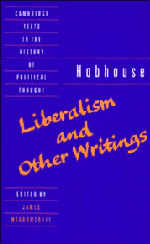Book contents
- Frontmatter
- Contents
- Acknowledgements
- Introduction
- Principal events in the life of L. T. Hobhouse
- Further reading
- Biographical notes
- Liberalism
- Other Writings
- Government by the People
- The Growth of the State
- The Individual and the State
- Irish Nationalism and Liberal Principle
- The Historical Evolution of Property, in Fact and in Idea
- Index
- Title in the series
The Historical Evolution of Property, in Fact and in Idea
Published online by Cambridge University Press: 05 June 2012
- Frontmatter
- Contents
- Acknowledgements
- Introduction
- Principal events in the life of L. T. Hobhouse
- Further reading
- Biographical notes
- Liberalism
- Other Writings
- Government by the People
- The Growth of the State
- The Individual and the State
- Irish Nationalism and Liberal Principle
- The Historical Evolution of Property, in Fact and in Idea
- Index
- Title in the series
Summary
Summary
A satisfactory account of the development of property in general has not yet been written, and perhaps in the present state of our knowledge cannot be written. In no department of the study of comparative institutions are the data more elusive and unsatisfactory. The divergence between legal theory and economic fact, between written law and popular custom, between implied rights and actual enjoyment, enables one and the same institution to be painted and, within limits, quite honestly and faithfully painted in very different colours. The legally minded historian will lay stress on forms or principles which have very little bearing on the actual life of the people. The economic historian, impatient of these subtleties, will ask us to look at the actual working of the institution, only to find that by some turn of events the dormant legal principle is awakened, and becomes a potent and perhaps deadly force in the working of a system. The theorist with a generalization to defend can always, by judicious selection and omission, quote travellers, ethnologists, early codes, or points of contemporary custom on his side; for he is singularly unfortunate if he cannot find something either in the every day working of the institution or in its theoretical implications, which, by ignoring other aspects, may be made to tell on his side.
- Type
- Chapter
- Information
- Hobhouse: Liberalism and Other Writings , pp. 175 - 198Publisher: Cambridge University PressPrint publication year: 1994
- 1
- Cited by



